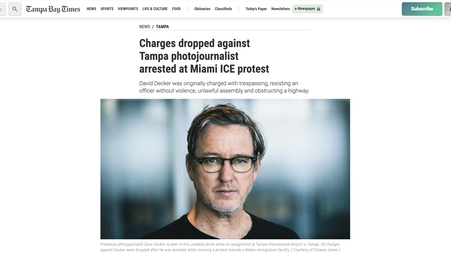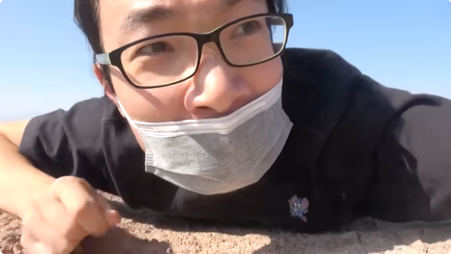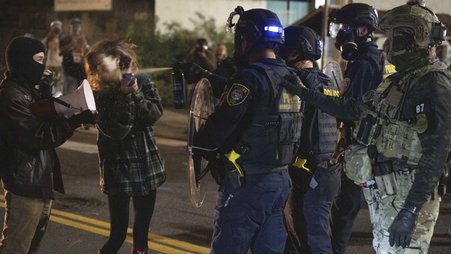FOR IMMEDIATE RELEASE:
Jury trials of journalists arrested while reporting news are exceedingly rare in the United States. The U.S. Press Freedom Tracker, a project of Freedom of the Press Foundation (FPF) that maintains data on press freedom violations nationwide, has documented only nine in its history.
The next two are scheduled to take place in Kenton County, Kentucky, in just a couple weeks. Journalists Madeline Fening and Lucas Griffith, both of whom were arrested while covering a protest on July 17 for Cincinnati-based CityBeat (Griffith is a student journalist at the University of Cincinnati who interned at CityBeat), are set to be tried Sept. 30 and Oct. 2, respectively. In an unfortunate irony, the protest was in opposition to the immigration detention of Ayman Soliman, who himself fled Egypt to escape persecution for his journalism.
A coalition of press freedom organizations and Cincinnati journalism professors sent a letter to the prosecutor, County Attorney Stacy Tapke, urging her office to drop the case. As the letter explains, when journalists are mistakenly arrested while covering protests, prosecutors usually decline to bring charges because they recognize that protests and their aftermath are newsworthy and journalists reporting on them are just doing their constitutionally protected jobs.
When prosecutors nonetheless push forward with these kinds of censorial charges, the cases often end in a dismissal and a civil settlement paid to the reporter, and those responsible are forced to explain why they wasted taxpayer funds trying to criminalize journalism.
Below are comments from representatives of several press freedom organizations that signed the letter, as well as from journalism professors at the University of Cincinnati (speaking in their individual capacities).
Comment from press freedom advocates
Seth Stern, director of advocacy at FPF, said, “With no end to civil unrest on the horizon, it’s more important now than ever that journalists are allowed to cover how police respond to protests. Officers engaged in misconduct have every incentive to disperse the press, which is precisely why the Department of Justice and courts have said that they can’t be allowed to do so. Even temporary detainments have a chilling effect, but putting journalists on trial for routine newsgathering is simply un-American. We hope prosecutors do the right thing without further delay.
Mickey Osterreicher, general counsel for the National Press Photographers Association (NPPA), said, “Despite the National Press Photographers Association having spent over a decade providing training to police regarding the First Amendment rights of journalists, it is disturbing that some officers and agencies have not learned to respect those rights. We sincerely hope that the county attorney will remedy this wrong by heeding our request to dismiss the remaining charges and not add insult to injury.”
Anne Marie Tamburro, press freedom strategist at the Society of Professional Journalists (SPJ), said, “It is inexcusable that journalists in the United States are being put on trial for exercising their First Amendment rights. We urge Kenton County officials to drop all charges and ensure that journalists can do their jobs of keeping the public informed without unwarranted interference from law enforcement.”
Katherine Jacobsen, U.S., Canada, and Caribbean Program Coordinator at the Committee to Protect Journalists (CPJ), said, “It is concerning to see that two journalists are facing jury trials in relation to their reporting activity. Journalism is not a crime, and reporters should not be punished for covering matters of public interest.”
Comment from journalism professors
Alfred J. Cotton III, director of undergraduate studies, associate professor-educator, journalism at the University of Cincinnati, said, “Lucas Griffith is one of the best student journalists on this campus. He’s a former student of mine, and I believe wholeheartedly in his integrity and dedication to pursuing the truth. I stand with the call to drop the charges against him and Madeline Fening.”
Victoria LaPoe, department head of the Department of Journalism at the University of Cincinnati, said, “While I cannot speak on behalf of the university, I can speak for myself and my personal views. As a former journalist — specifically a television producer who would get out of the newsroom and on the ground to cover trials, protests, and breaking news — I witnessed firsthand how quickly situations can turn chaotic. I believe what is truly at risk here are core constitutional freedoms. The precedent this could set is deeply troubling. Journalists serve as the eyes and ears of an event, allowing citizens to be informed and make their own decisions. I hope it is beyond question that, in this situation, a journalist — and a student intern — should not face such severe charges for simply attempting to serve their community.”
Jenny Wohlfarth, a professor-educator in the Department of Journalism at the University of Cincinnati, added, “Newsgathering is a protected right under the First Amendment. What’s at stake here is not just these two reporters’ fates, but also the fundamental constitutional rights of a free press that are protected for all of us under the First Amendment. In helping prepare the journalists of tomorrow, we educators must teach our students the value of a free press, why it’s so critically important in a democracy, and how they must uphold the highest ethical standards in covering news events, both near and far. Without journalists to cover events like this, the public loses access to credible and accurate information that members of a free press routinely provide to help the public stay informed.”
The charges against the journalists originally included felony rioting, but that charge was dropped in July. The remaining misdemeanor charges against Fening include disorderly conduct, obstructing an emergency responder, failure to disperse, unlawful assembly, and obstructing a highway or public passage. Griffith is charged with those offenses plus resisting arrest.
You can read the letter here or below. If you have questions or would like further comment, please reach out to FPF at [email protected], NPPA at [email protected], SPJ at [email protected], or CPJ at [email protected].





